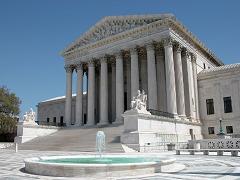Washington
The Port Angeles School District board will discuss taking an official position on statewide Initiative 1033 at its meeting today at 7 p.m. at Roosevelt Elementary School, 106 Monroe Road. The initiative would cap revenues for the state and all county and city governments based on 2009’s final figures. I-1033, which is on the Nov. 3 ballot now being voted in the all-mail election, would not directly impact school districts.
If you have never registered to vote in Washington and want to cast a ballot in the November 3 General Election, do it soon. Monday, October 26, is the last day for in-person registration for citizens not currently registered to vote in the Evergreen State. People should go to their county elections office to register in person.
As the U.S. Supreme Court decides whether signatures on the Referendum-71 petition in Washington state should be made public, a public opinion battle is heating up. Compelling arguments are surfacing on both sides of the issue, with each side calling on the High Court to rule in their favor.
After U.S. Supreme Court Justice Anthony Kennedy issued a temporary block on the release of Washington petition signers names on Monday, the full court ruled 8-1 on Tuesday to reaffirm Justice Kennedy’s order.
If you would like to read more about the decision you can check out the article here.

Even if you don’t spend much time at the Courthouse or City Hall, it’s hard to escape the debate over Initiative 1033, Tim Eyman’s tax-cutting proposal on the Nov. 3 ballot. If passed, it would place new limits on the growth of “general fund” revenues received by state, city and county governments. A complicated formula directs how the initiative would work, but basically, it provides that if various revenues to governments rise because of an improving economy, governments will be required to reduce that income or use the overage to reduce the property tax levy.
Last week, I traveled to Pierce County, Washington, to take part in an event entitled “The Fight for Democracy in Pierce County,” which was held at the University of Puget Sound. The forum was set up by folks with No Rigging the System, a group campaigning to defeat three measures on the county ballot this November 3rd.
Washington voters will decide between now and Nov. 3 whether to cap property taxes, add additional protections for conservation land and whether to extend the rights of married spouses to domestic partners. King County voters will also decide to update language in the county charter through a series of housekeeping measures for which voter approval is required. The statewide property tax measure, however, has attracted attention from Sammamish municipal and school district officials.
U.S. Supreme Court Justice Anthony Kennedy has ordered the Washington Secretary of State not to release the names and addresses of voters who signed the petition for Referendum 71.
Supreme Court Justice Anthony Kennedy has temporarily blocked Washington state officials from releasing the names of people who signed a ballot measure on gay rights. Kennedy’s ruling Monday temporarily blocks a federal appeals court ruling last week that ordered the release of the names. Kennedy said his order would remain in effect while he considers a request by a pro-marriage group that asked him to reverse the appeals court ruling.
In July, the Sequim City Council placed a Transportation Benefit District initiative on the ballot. It provides for revenues to be used exclusively for approved city transportation projects. A two-tenths of 1 percent increase in city sales-and-use taxes would be levied on certain items and services; the cost of a $10 purchase would increase by 2 cents. Necessities such as groceries, prescriptions, gasoline, rent, insurance and mortgages would not be affected.
We’ve previously blogged about the battle in Washington state over whether or not the state government should release the personal information of petition signers to the public. The fight continues.
Yesterday, a state superior judge in Washington ordered Secretary of State Sam Reed to keep the petition signer information private. This move essentially blocks the Secretary of State from releasing the names until the federal case is resolved in the 9th Circuit Court of Appeals.
A staunch supporter of Initiative 1033 on November’s ballot says taxpayers should have more say on how government spends their money. An opponent of Tim Eyman’s ballot measure says the loss of the rainy-day reserve would “kill local government” and force drastic cuts to government services. “It allows government to grow but only at a rate that citizens control,” said Shelley Taylor, a tax-limit advocate, in a spirited debate at the Port Angeles Regional Chamber of Commerce luncheon on Monday.
Snoqualmie’s City Council will consider approving a resolution opposing Initiative 1033 on Oct. 12.Initiative 1033 seeks to limit the growth of city, county and state governments by prohibiting general fund revenues from increasing faster than the rate of inflation and population growth. The initiative requires any revenue collected by the state, county or city in excess of the rate of inflation and population growth to be used to reduce property taxes.
The Tacoma Public Library and the League of Women Voters of Tacoma-Pierce County will sponsor a public forum on several ballot measures tonight. News Tribune columnist Peter Callaghan will moderate a discussion of the following issues: Initiative 1033, which would cap the growth of state and local government general fund revenue, based on an annual rate of inflation and population growth.
A broad coalition of business, labor, education and seniors today launched an effort to defeat Tim Eyman’s latest ballot measure, Initiative 1033. “1033 is bad for jobs and it would greatly diminish access to health care,” said Doug Shadel, state director of AARP. The initiative, on November’s ballot, would cap the yearly growth of state, county and city general funds at the rate of inflation, plus population growth. Any revenue above the cap would be used to lower property taxes. Voters could approve revenue increases above the cap.
